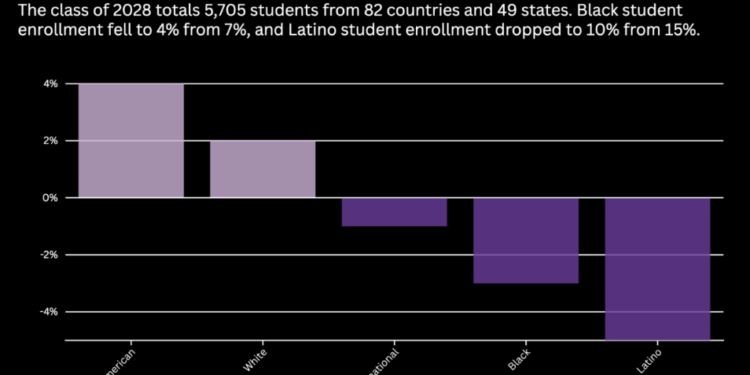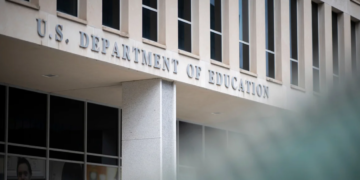Oct 18, 2024 Story by: Editor
NYU reported a significant decline in enrollment among underrepresented minority students in its first admissions cycle following the U.S. Supreme Court’s affirmative action ban, describing the trend as “concerning” in a press release on Wednesday.
The class of 2028 data shows that “historically underrepresented minority groups” — identified by NYU as Black, Hispanic, Native American, Hawaiian, and other Pacific Islander students — now make up only 14% of first-year students, down from 23% last year. Specifically, Black student enrollment dropped from 7% to 4%, and Latino enrollment from 15% to 10%. NYU did not specify figures for Native American, Hawaiian, or Pacific Islander students.
In its release, NYU stated these changes were “not unanticipated” and linked them to the Supreme Court’s 2023 ruling that dismantled race-based admissions practices, a decision NYU previously criticized as “a step backwards” in a letter to its community.
“NYU wants a student body that thrives on difference,” said NYU President Linda Mills. “We will — we must — continue to innovate on and expand educational opportunities for students of all backgrounds and experiences.”
Ahead of the ruling, NYU’s Office of Global Inclusion, Diversity and Strategic Innovation issued a June 2023 statement emphasizing that “race as a lived experience continues to ‘matter’ regarding access and opportunity.” The university also noted plans to work with its Office of General Counsel to advance diversity, equity, and inclusion goals “through legally permissible means.”
The university also highlighted that the percentage of first-generation college students held steady at 21%, while the share of Pell Grant-eligible students rose from 19% to 23%. The class of 2028 marks the first group benefiting from the NYU Promise, which waives tuition for students admitted to the Washington Square and Brooklyn campuses from households earning under $100,000 annually.
Despite decreases in Black and Latino enrollment, Asian American first-year enrollment increased from 22% to 27%, while white student enrollment rose from 21% to 23%. The proportion of international students saw a minor decrease, dropping from 27% to 26%. The incoming class consists of 5,705 students from 82 countries and 49 states.
The Supreme Court’s 2023 decision arose from cases filed by Students for Fair Admissions against Harvard University and the University of North Carolina at Chapel Hill in 2014, arguing that race-sensitive admissions disadvantage white and Asian American applicants.
NYU is not alone in these trends; similar declines in first-year Black and Latino enrollment have been observed at other private New York universities, including Cornell and Columbia. In states with previous affirmative action bans, like Michigan in 2006 and California’s public universities in 1996, minority enrollment has also historically decreased.
Before the ruling, NYU marked applicants’ racial and ethnic identities as “considered” in its annual Common Data Set, a report that includes admissions demographics and other data. This year’s set has not yet been released. For the 2022-23 admissions cycle, the university also replaced its “Why NYU?” essay with an optional prompt focused on diversity.
“While the legal landscape changes, our values do not,” Mills said. “We must innovate — while always complying with existing law.” Source: NYU News

















